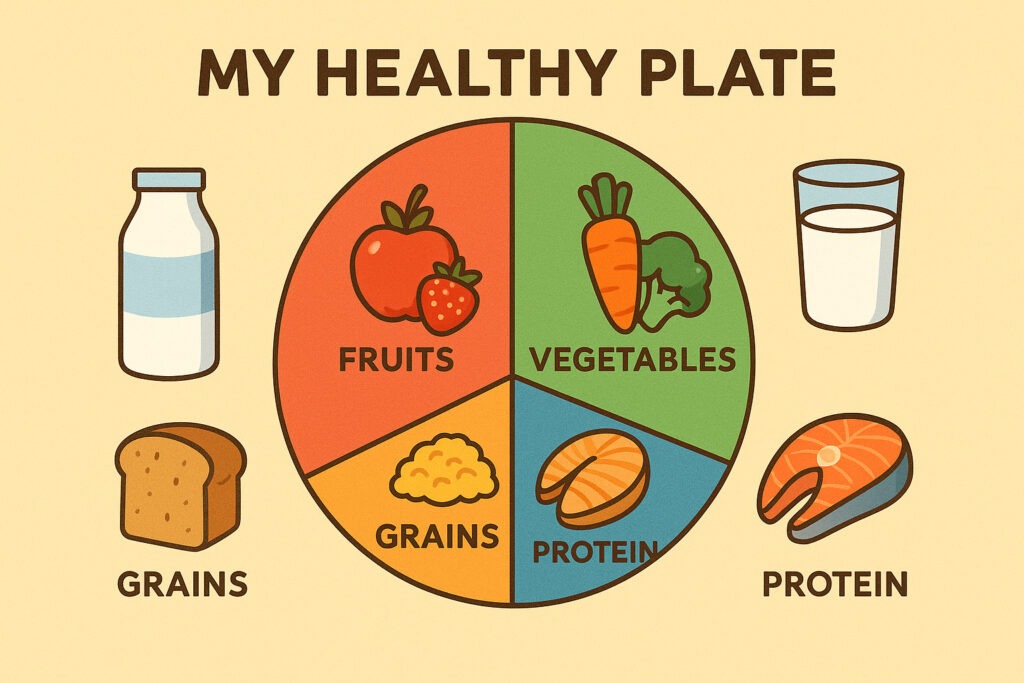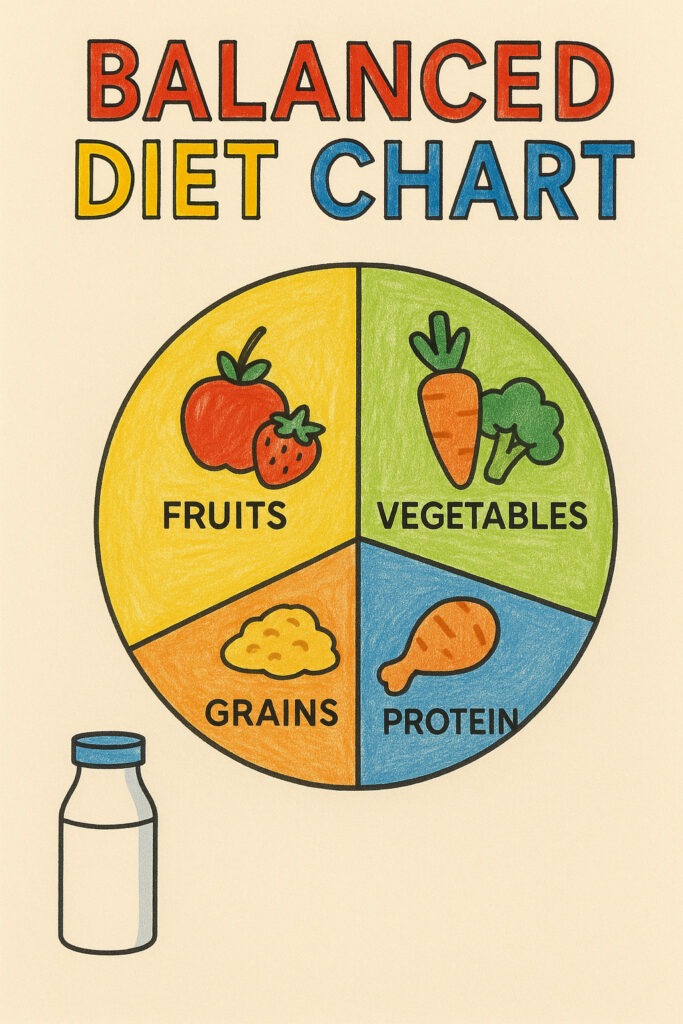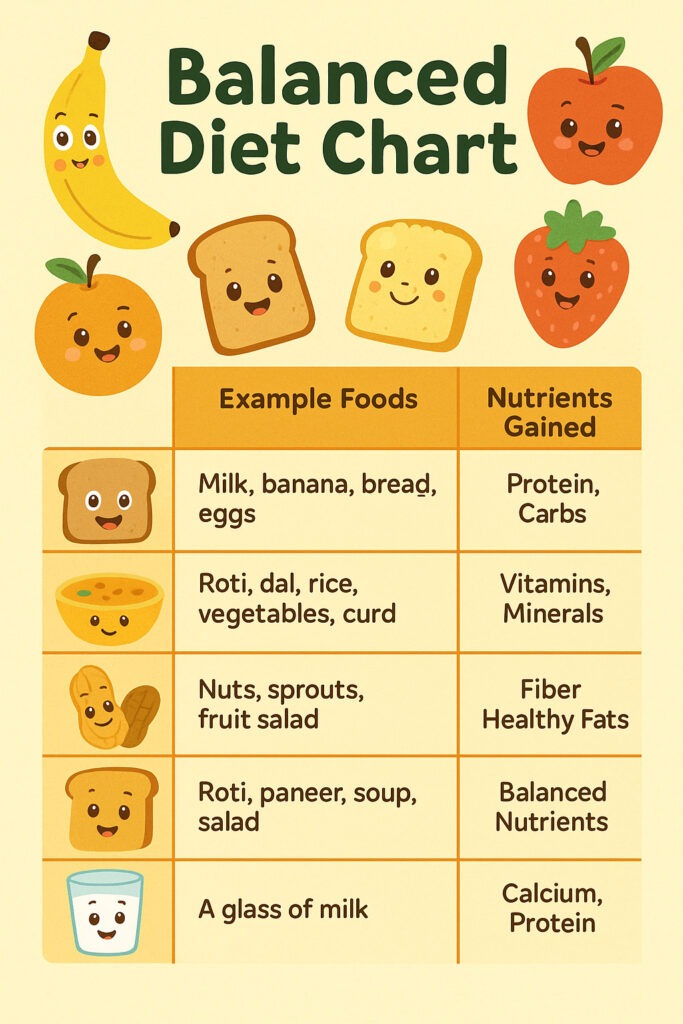Table of Contents
A balanced diet means eating the right amounts of various nutrients that our body needs to stay healthy, active, and strong. It is especially important for school-going children as they are in their growing years. A good diet helps children concentrate better in class, boosts energy levels, and keeps illnesses away.

Components of a Balanced Diet
| Nutrient | Purpose | Food Sources |
| Carbohydrates | Give energy | Rice, roti, bread, potatoes |
| Proteins | Build muscles and repair tissues | Milk, eggs, dal, paneer, meat |
| Fats | Provide energy, support cells | Butter, oil, nuts (in small amounts) |
| Vitamins | Fight diseases, help growth | Fruits, leafy vegetables |
| Minerals | Strengthen bones, teeth, muscles | Milk, spinach, bananas |
| Water | Keeps body hydrated and active | Drinking water, fruits |

What Makes a Diet “Balanced”?
A balanced diet includes foods from all major nutrient groups:
- Carbohydrates – Found in rice, roti, bread, potatoes; they give energy.
- Proteins – Found in milk, eggs, pulses, paneer, fish; they help in body building.
- Fats – Found in butter, oil, nuts; they provide energy but should be eaten in moderation.
- Vitamins & Minerals – Found in fruits and vegetables; they protect us from diseases.
- Water – Keeps our body hydrated and helps in digestion.
How to Make a Balanced Diet Chart for School Project
Below are the step to make a balanced diet chart for scho0l project
- Choose your class and title the chart accordingly
- Draw a table with meal timings: Breakfast, Lunch, Snacks, Dinner.
- Under each, write foods with their nutrient benefits.
- Use colored pencils or printed images.
- Add one line for why each food is important.
- Neatness and creativity are key.

Sample Balanced Diet Chart Table (All Classes)
| Meal Time | Example Foods | Nutrients Gained |
| Breakfast | Milk, banana, bread, eggs | Protein, Carbs, Fiber |
| Lunch | Roti, dal, rice, vegetables, curd | Protein, Carbs, Vitamins, Minerals |
| Evening Snack | Nuts, sprouts, fruit salad | Fiber, Healthy Fats |
| Dinner | Roti, paneer, soup, salad | Balanced Nutrients |
| Bedtime | A glass of milk | Calcium, Protein |

Class-Wise Balanced Diet Chart for School Project
Below is the class-wise balanced diet chart for school project-
Balanced Diet Chart For School Project Class 2
A balanced diet helps children grow tall, run fast, and stay happy. Foods like milk, fruits, bread, and eggs give us strength and energy. It’s important to eat on time and avoid too many sweets.
- Morning: Glass of milk and banana
- Lunch: Chapati, dal, and vegetables
- Evening Snack: Fruits like apple or papaya
- Dinner: Rice, curd, and cooked vegetables
Balanced Diet Chart For School Project Class 3
We must eat food from all groups to stay healthy. Our food should have Energy Foods (like bread and rice), Body-Building Foods (like milk and paneer), and Protective Foods (like fruits and vegetables).
| Time | Food Example | Food Group |
| Morning | Bread & Milk | Energy + Body-Building |
| Lunch | Rice, Dal, Veggies | All 3 groups |
| Snack | Fruits/Nuts | Protective |
| Dinner | Roti, Dal | Energy + Protein |
Balanced Diet Chart For School Project Class 4
Our body needs six types of nutrients—carbohydrates, proteins, fats, vitamins, minerals, and water. A balanced meal includes at least 3–4 of these. Healthy food helps us study better and play harder.
- Breakfast: Poha with vegetables + Milk
- Lunch: Chapati, Dal, Curd, Mixed Vegetables
- Evening Snack: Fruit Chaat
- Dinner: Roti with Paneer and Salad
Balanced Diet Chart For School Project Class 5
Eating a balanced diet daily keeps us strong and helps in learning. Junk food like chips and soda should be eaten very rarely. Fresh home-cooked food is always better.
| Meal Time | Healthy Option | Unhealthy Option to Avoid |
| Breakfast | Milk + Boiled Eggs | Chips, Soft Drinks |
| Lunch | Rice, Dal, Vegetables | Fried Instant Noodles |
| Snacks | Sprouts, Fruits | Candy, Chocolates |
| Dinner | Roti, Paneer, Soup | Fast Food (Burgers, Pizza) |
Balanced Diet Chart For School Project Class 6
Our body needs calories to function, but only from healthy sources. Drink at least 6–8 glasses of water daily. Include roughage (fiber), vitamins, and enough proteins in your diet.
- Breakfast: Idli with chutney + Banana
- Lunch: Rice, Sambar, Beans Stir-Fry, Curd
- Snacks: Roasted Chana + Coconut Water
- Dinner: Chapati, Dal, Mixed Vegetable Curry
Balanced Diet Chart For School Project Class 7
As we grow, our diet needs to include more protein, iron, and calcium. Avoid skipping breakfast—it gives your brain the fuel it needs. Replace junk snacks with fruits or home-cooked items.
Key Tips:
- Protein builds muscles.
- Iron (in spinach, jaggery) prevents weakness.
- Calcium (milk, paneer) strengthens bones.
Daily Diet Sample:
- Morning: Oats with milk, almonds
- Lunch: Roti, Rajma, Bhindi Fry
- Snacks: Apple + Groundnuts
- Dinner: Dosa with sambar + Curd
Balanced Diet Chart For School Project Class 8
Balanced eating isn’t just about food—it’s also about timing, moderation, and hydration. As adolescence begins, our bodies need iron, calcium, vitamins, and balanced calories.
- Morning: Milk + Roti
- Lunch: Roti, Rajma, Bhindi Fry
- Snacks: Sprouts
- Dinner: Roti + Sabzi + Curd
FAQs on Balanced Diet Chart for School Project
What is a balanced diet for students?
A mix of grains, protein, fruits, vegetables, water, and limited fats.
Can I draw the chart or print it?
Yes, both hand-drawn and printed charts are accepted.
Is milk important every day?
Yes, it provides calcium for strong bones.
How to explain a balanced diet to Class 2 students?
Use drawings and easy phrases like Milk makes me strong.
Where can I download a diet chart PDF?
You can download the diet chart pdf from Infinity Learn.








